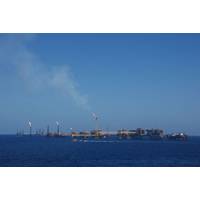Occidental Petroleum predicts flat production and lower spending in 2026
Occidental Petroleum, an oil and gas company, said Tuesday that it expects a flat growth in production and lower spending than the current year levels by 2026 as crude prices fall. The U.S. shale oil producers are coping with a global oil crisis, as prices remain in the $60 per barrel range. This is due to OPEC+ production increases and a slowing of global demand. Benchmark Brent crude prices have fallen by about 12.7% this year. Sunil Mathew, Chief Financial officer of Occidental, said in a conference call that the company expects production to remain flat or increase by 2% between 2026 and 2027…
Chevron hires TotalEnergies to shake up its exploration team
Chevron named a new global exploration head on Tuesday as CEO Mike Wirth strives to improve the track record of the company in discovering new oil and gas sources. Kevin McLachlan, vice president of exploration, will succeed Liz Schwarze in November, after she retires from Chevron in February, following 36 years. McLachlan's experience includes senior vice presidents of exploration for several oil companies, including TotalEnergies. He has also held positions at Murphy Oil and Nexen. Wirth is disappointed with the recent exploration results. Chevron has oil and gas reserves.
OPEC+ Oil Pact Hinges on Mexico Joining

Saudi Arabia's energy minister said on Friday that a final OPEC+ oil supply pact to reduce 10 million barrels per day (bpd), which was agreed on Thursday, hinges on Mexico joining in the cuts.OPEC, Russia and other allies, a group known as OPEC+, outlined plans on Thursday to cut their oil output by more than a fifth, but said a final agreement was dependent on Mexico signing up to the pact after it balked at the production cuts it was asked to make. Discussions among top global energy ministers will resume on Friday."I hope (Mexico) comes to see the benefit of this agreement not only for Mexico but for the whole world.
OPEC+ Outlines Record Oil Production Cut; Mexico Balks

OPEC, Russia and other allies outlined plans on Thursday to cut their oil output by more than a fifth and said they expected the United States and other producers to join in their effort to prop up prices hammered by the coronavirus crisis.But the group, known as OPEC+, said a final agreement was dependent on Mexico signing up to the pact after it balked at the production cuts it was asked to make. Discussions among top global energy ministers will resume on Friday.The planned output curbs by OPEC+ amount to 10 million barrels per day (bpd) or 10% of global supplies…
As Oil Crisis Deepens, Hedge Funds Sense a Turnaround

Hedge fund managers sensed oil prices were nearing a turning point last week, and for the first time in more than two months started to add long positions in anticipation prices would bounce from an unsustainable low.Overall, hedge funds and other money managers were still net sellers of 19 million barrels of petroleum in the six most important futures and options contracts in the week ending on March 31.But they initiated 40 million barrels of new purchases as well as 59 million barrels of fresh sales, according to position records published by ICE Futures Europe and the U.S.
Russian Oil Output Down in October

Russia lowered its oil output to 11.23 million barrels per day (bpd) last month from 11.25 million bpd in September, missing again its obligations under a global pact to curb production, energy ministry data showed on Saturday.The Organization of the Petroleum Exporting Countries, Russia and other producers - a group known as OPEC+ - have since January implemented a deal to cut oil output by 1.2 million barrels per day to support the market.According to Reuters calculations, which use a tonnes/barrel ratio of 7.33…
Equinor Looks to Cut More Costs at Giant North Sea Oilfield

Norway's Equinor sees scope to further reduce development costs at the Johan Sverdrup oilfield in the North Sea, as it looks to maximize the potential of what could be the last giant field to be found off the Nordic country.The field, one of the five largest oil finds offshore Norway, is estimated to contain up to 3.1 billion barrels of oil equivalents, mainly crude oil, enough to meet Britain's oil demand for five years.Sverdrup is on track to begin production in late 2019 and could produce up to a quarter of Norway's overall petroleum output at its peak.Equinor…
Chesapeake Energy Woes Cast Shadow on U.S. Pipeline Companies
U.S. oil and gas pipeline companies including Williams Companies Inc and Kinder Morgan Inc have contracts worth billions of dollars that might be at risk as Chesapeake Energy Corp aims to slash its debts amid collapsing energy prices. Chesapeake said on Monday it had no plans to file for bankruptcy after sources told Reuters the firm, whose debt is eight times its market value, had asked its longtime counsel to look at restructuring options. The way it deals with its financial woes could be a lifeline or death sentence for midstream pipeline companies.
U.S. Shale and OPEC, the Altered Balance of Power
Two landmark events this month will underscore the extent to which the oil market's balance of power has been transformed by the shale revolution. In Washington, Congress will begin considering legislation to permit the export of crude oil from the United States, reversing a four decade ban put in place after the first oil crisis in 1973/74. In Vienna, the Organization of the Petroleum Exporting Countries (OPEC) is expected to roll over its crude production target of 30 million barrels per day (bpd) even though prices have fallen more than 40 percent over the last 12 months.
U.S. Set to for More Accurate Oil Production Data
Figures on U.S. oil production are subject to much more uncertainty than the numbers for oil stocks, refinery throughput and imports because the Energy Information Administration (EIA) has to rely on state-level data rather than its own surveys. That could be about to change, however, because the EIA has received approval from the White House to launch its own mandatory monthly survey of oil and condensate production. The first of the new survey forms have gone out and respondents are beginning to submit data.
Petrobras is Largest Operator of Floating Production Platforms
Petrobras now operates more floating production platforms (including self-owned and chartered ones) than any other company in the world, according to Petrodata, a consulting firm that specializes in providing information about the global oil industry. According to the company’s latest figures, as of December 2014 Petrobras operated 110 offshore production units off the Brazilian coast. This total included 45 floating platforms, broken down into 29 floating production, storage and offloading vessels (FPSOs), 15 semi-submersible platforms, and one production vessel, P-53, which differs from FPSOs in that it does not store oil.
Kemp: News of OPEC's Demise Has Been Much Exaggerated
The Organization of the Petroleum Exporting Countries (OPEC) last week made no change to its production target despite a 40 percent slide in oil prices over just five months, causing some commentators to pronounce the cartel irrelevant. If OPEC cannot act to defend the prices and revenues of its member countries, does the organization still serve any purpose? There is an assumption among some commentators that OPEC is only relevant and working if ministers can reach a production agreement in response to shifts in prices, and that strong disagreement is a sign of dysfunction.
US House to Hold Hearing on Oil Export Ban

A House of Representatives panel will hold a hearing on Dec. 11 to explore whether a decades-old law that prohibits the export of crude oil makes sense in an era of domestic energy abundance. The House subcommittee on energy and power, chaired by Representative Ed Whitfield, will hone in on the 1975 Energy Policy and Conservation Act, drafted in response to the 1973 oil crisis. The law prohibited the export of most crude oil, created the Strategic Petroleum Reserve and Corporate Average Fuel Economy rules for cars and trucks, also known as CAFE standards.
Med Tanker Market Pins Freight Rate Hopes on Libya Oil Export Push
Rising oil exports from Libya after months of disruption helped push Mediterranean tanker rates to the highest levels in nearly six months on Wednesday, and shipping players expected more gains in earnings as shipments from the OPEC member step up. Aframax tankers on the Mediterranean route, which transport the majority of Libya's crude oil, normally carry loads of up to 600,000-700,000 barrels. Rates have been depressed in recent months due in part to slower exports from Libya. Cross Mediterranean rates for aframax tankers rose on Wednesday to W126.70 in the worldscale measure of freight rates…
Libya Oil Exports Stutter, Major Eastern Ports Await Restart
Libya will not be able to export oil through its two largest eastern ports before August, due to safety checks after a near year-long closure, a senior oil official said on Wednesday. The latest twist in a spiral of violence also casts a shadow over the vital deal two weeks ago to end the eastern blockade by federalist protesters of the last two facilities they held. Until April, the rebels were holding four out of five eastern ports, cutting off over half of Libya's export capacity. But an oil export return is proving slow and a full ramp up is already facing new obstacles with a fresh protest by oil guards at the port of Brega.
Oil Futures Fall as Libya Says Oil Crisis is Over
Crude oil on both sides of the Atlantic dropped on Thursday as supply fears began to ease after Libya declared an end to an oil crisis that has slashed exports from the OPEC member. Libya's government said it had reached a deal with a rebel leader controlling oil ports involving the handover of the last two terminals, potentially making an extra 500,000 barrels per day (bpd) of crude available for export. "It's very much the Libyan situation and this stasis in Iraq, the supply tightness fears are quickly evaporating," said John Kilduff, partner at Again Capital LLC in New York.
Spot Falls On Sunny Weather, Less Demand
Declining demand headed into the weekend and forecasts for abundant solar supply pulled central European spot power lower on Thursday though Hungarian prices remained at a regional premium, traders said. On regional exchanges, Czech and Slovak electricity for Friday fell 1.6 percent to 33.18 euros ($45.26)per megawatt hours while Hungarian day ahead dipped a little more than 3 percent to 37.92 euros. Data from Thomson Reuters Point Carbon showed wind generation for Friday in Germany would dip slightly to 2 gigawatts while solar output would jump about 2 GW to 8.6 GW.
Brent Falls Below $111, Libya Says Oil Crisis Is Over
U.S. Brent crude futures fell below $111 a barrel on Thursday as supply fears began to ease after Libya declared an end to an oil crisis that has slashed exports from the OPEC member. Libya's government said it had reached a deal with a rebel leader controlling oil ports involving the handover of the last two terminals, potentially making an extra 500,000 barrels per day (bpd) of crude available for export. "The market has been waiting for this. The question now is how long it will take for flows to come out," said Ole Hansen, senior commodity strategist at Saxo Bank.
Obama Announces Actions On Renewable Energy
President Barack Obama announced steps on Friday to increase the use of solar panels, boost energy efficiency in federal buildings and train more people to work in the renewable energy field. "It's the right thing to do for the planet," Obama said, standing in the outdoor lighting display section of a WalMart store that features roof-top solar panels and a charging station for electric vehicles, among other energy-saving retrofits. The president used the stop to show how major corporations have committed to increasing the generation of solar power at their facilities.